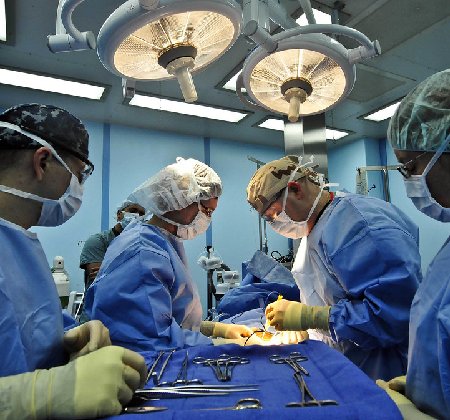Hip replacement surgery, medically known as total hip arthroplasty, is a procedure designed to alleviate pain and restore function in a damaged or diseased hip joint. Typically recommended for individuals with conditions such as osteoarthritis, rheumatoid arthritis, or hip fractures, this surgical intervention involves removing the damaged parts of the hip joint and replacing them with artificial components.
Hip replacement surgery
During the procedure, the surgeon removes the damaged femoral head and replaces it with a metal or ceramic ball attached to a stem that is inserted into the femur. The damaged hip socket is then replaced with a metal cup, often lined with a durable plastic liner. The artificial components mimic the natural movement of the hip, allowing for improved joint function and reduced pain. Post-surgery, patients undergo rehabilitation to regain strength and mobility.


Dr. Pratik Dhabalia is a distinguished hip replacement surgery specialist based in Raipur, known for his exceptional skills and dedication to patient care. With years of experience in the field of orthopedics, Dr. Dhabalia has established himself as a leader in hip replacement surgery, offering innovative and personalized treatment options to patients suffering from hip-related ailments. His practice is grounded in the latest medical advancements and techniques, ensuring that his patients receive the most effective treatment possible.
Dr. Dhabalia’s approach to patient care is holistic, focusing not just on the surgical procedure but on the patient’s overall health and recovery. He is committed to providing comprehensive support throughout the healing process, including post-surgery rehabilitation and guidance on maintaining hip health. His expertise, coupled with a compassionate bedside manner, makes him a trusted choice for individuals seeking relief from hip pain and mobility issues. Dr. Dhabalia’s dedication to excellence and patient satisfaction has made him a revered hip replacement surgeon in Raipur and beyond.



FAQ...
What is hip replacement surgery?
Hip replacement surgery, or total hip arthroplasty, is a medical procedure where a damaged or diseased hip joint is replaced with artificial components to reduce pain and improve function.
When is hip replacement surgery recommended?
It is typically recommended for individuals with conditions such as osteoarthritis, rheumatoid arthritis, or hip fractures, where conservative treatments no longer provide relief.
How is the surgery performed?
The surgeon removes damaged parts of the hip joint, replacing the femoral head with a metal or ceramic ball and the hip socket with a metal cup lined with a plastic liner.
What are the risks associated with hip replacement surgery?
Risks may include infection, blood clots, implant dislocation, and anesthesia-related complications. However, these risks are generally low.
How long is the recovery period after hip replacement surgery?
Recovery varies, but patients typically begin walking with assistance soon after surgery and engage in physical therapy to regain strength and mobility. Full recovery may take several weeks to months.
What is the expected lifespan of a hip replacement?
Modern implants can last 15-20 years or more, depending on factors such as patient activity level and implant materials.
Are there restrictions on activities after hip replacement?
Initially, there may be restrictions on certain movements, but most patients can eventually return to normal activities, including low-impact exercises.
What measures can be taken to ensure a successful recovery?
Following the post-operative care plan, attending physical therapy, and maintaining a healthy lifestyle are crucial for a successful recovery.
Can both hips be replaced simultaneously?
While it is possible, surgeons often prefer staged procedures to minimize stress on the patient and optimize recovery.
Who is an ideal candidate for hip replacement surgery?
Ideal candidates are individuals with significant hip joint damage causing persistent pain and reduced mobility, and for whom conservative treatments have been ineffective. Evaluation by an orthopedic surgeon helps determine candidacy.
